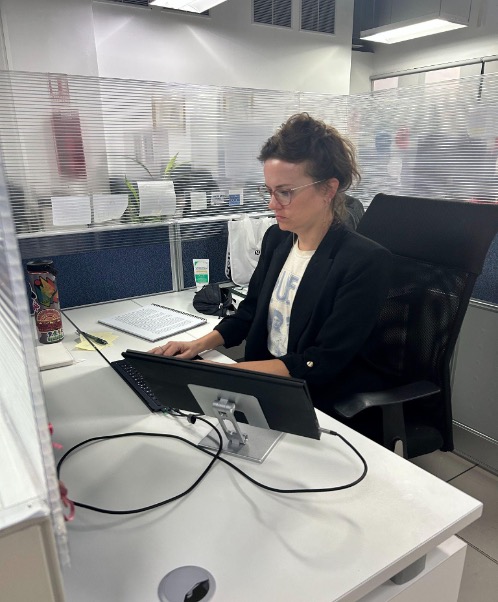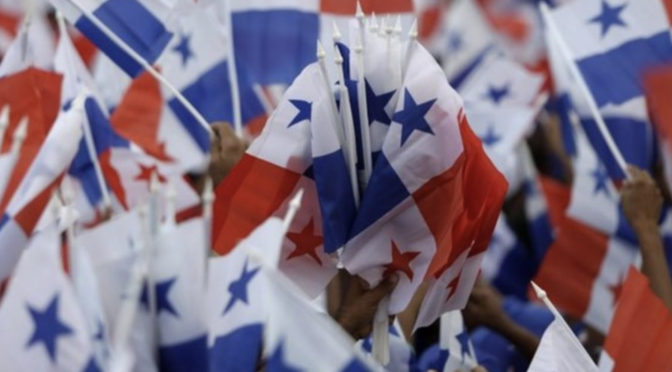By Kaitlin Passafiume, PhD candidate in the UT Spanish and Portuguese Department
As I wrap up the initial month of working with International IDEA at the Electoral Tribunal in Panama, I reflect on the diverse experiences that I have enjoyed in a short period of time. My completion of this internship signals an ability to successfully pivot from an academic background, using my critical humanities formation for public-facing work going forward. I remain convinced that cultural considerations have their place in governmental and extra-governmental projects, and I am heartened to find that the public arena in Panama considers and even encourages diverse perspectives.
To begin, I must describe the collaborative dynamic of the IDEA office at the Electoral Tribunal. In the same space, lawyers, data analysts, administrative assistants, interns, visiting scholars, program managers, and institutional directors undertake individual projects and engage within teams to leverage the specialized knowledge of all of these groups in working toward various goals. In my case, I work most closely with the Institute for Democratic Studies (INED) at the Electoral Tribunal supporting a team dedicated to the diffusion of civic culture.

Within this busy, female-led team, my project conceives, organizes, and executes the first-ever symbolic youth voting program to be exercised in Panama on the same day as the general election on May 5, 2024. I feel honored to have a direct hand in this project’s creation, and the significance of my role in fostering tangible benefit through public works does not escape me. The project manager utilizes my investigative skills as I continue to create information archives detailing various Latin American and global youth voter campaigns. As I compile pertinent information related to these programs’ histories, planning processes, marketing strategies, and evolution over time, our team is able to learn from other nations’ past experiences, identifying best practices and avoiding possible pitfalls in the case of Panama’s pilot exercise.
Over the course of the youth voter program’s realization, I have been included in various high-level planning sessions with top Electoral Tribunal officials, including Magistrate Luis Alfonso Guerra Morales who sits on the Electoral Tribunal’s Supreme Court of Justice. I frequently meet with other program directors, and regularly attend meetings with INED’s director Salvador Sánchez González as we prepare to present our project for approval. Just last week, I had the great pleasure of collaborating with Clara Inés Luna Vásquez of UNICEF, since our project seeks support from global entities in determining how to maximize our reach and potential.

In a more general sense, IDEA organizes frequent visits to key institutional resource headquarters like the Archivo Nacional, the Biblioteca Nacional, the International Center for Political and Social Studies (CIEPS), among others. Additionally, interns participate in the Día Naranja activities, a UN initiative celebrated on the 25th of each month to advocate the elimination of all forms of violence against women. This initiative illustrates the Electoral Tribunal’s dedication to diversifying Panamanian governmental interests as it strives to put an end to violence against women. Last week for example, the UT-affiliated interns attended a presentation by Dr. Flavia Freidenberg who compelled attendees to act, encouraging listeners to demand the equal participation of women in government, especially in elected positions.

Finally, I would like to outline the overall effect of my collaboration with IDEA as it relates to professional development. I do this by explaining the ways in which I envision this internship buttressing my career aspirations while explaining how my expertise has mutually aided IDEA, INED, and the Electoral Tribunal in their respective goals. I benefit immensely from seeing up close how an entity like the Electoral Tribunal operates from a macro to a micro perspective. It is illuminating to experience the many lives lived by a single project, and the innumerable fragments that dictate success. I have further developed many hard and soft skills that will aid me as I position my humanities background for public work, and my usefulness here validates my career goals as I embark on a path to eventual public diplomacy. Each intern from our Summer 2023 collaboration between the University of Texas at Austin and IDEA at the Electoral Tribunal has been met with their own unique set of trials and celebrations. I confidently count my stay in Panama as one that will define the steps I take going forward, and I sense that I will credit this opportunity with career growth as I realize my personal and professional ambitions.
